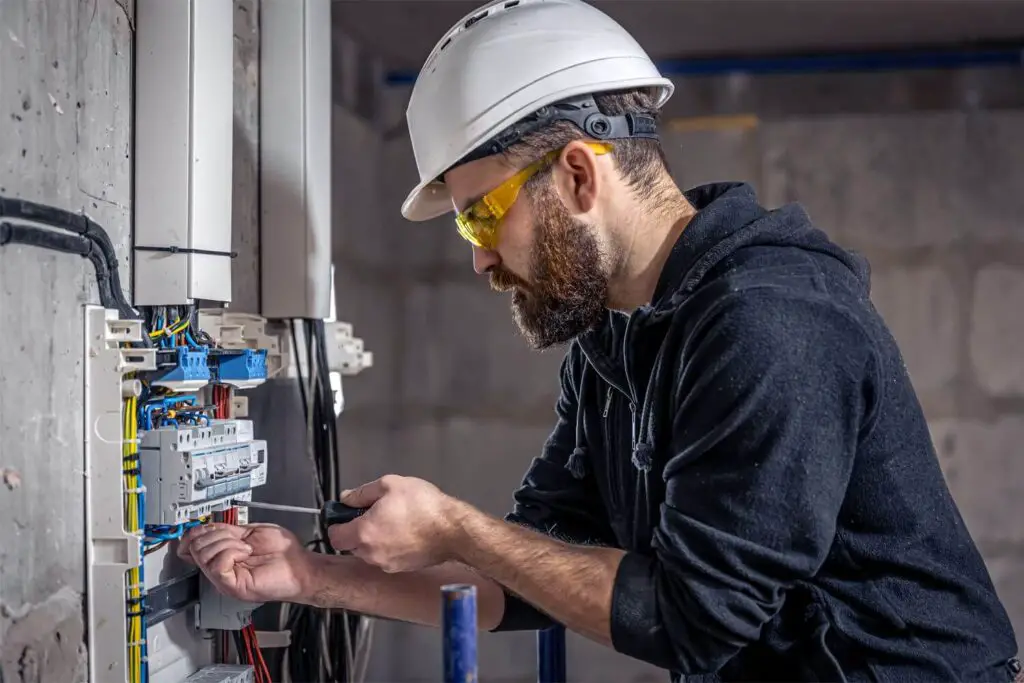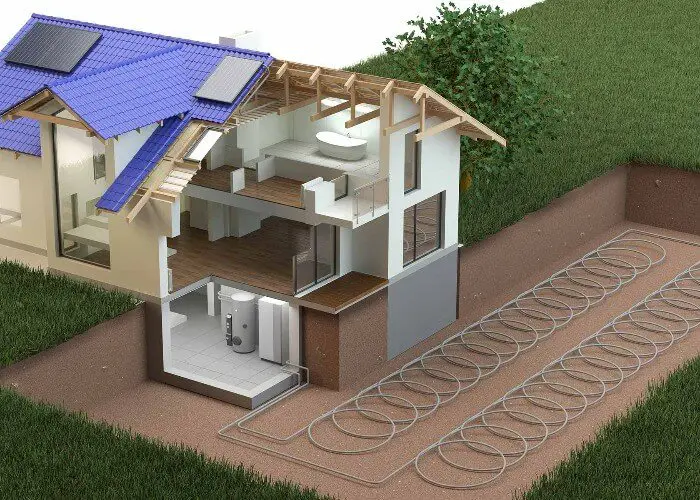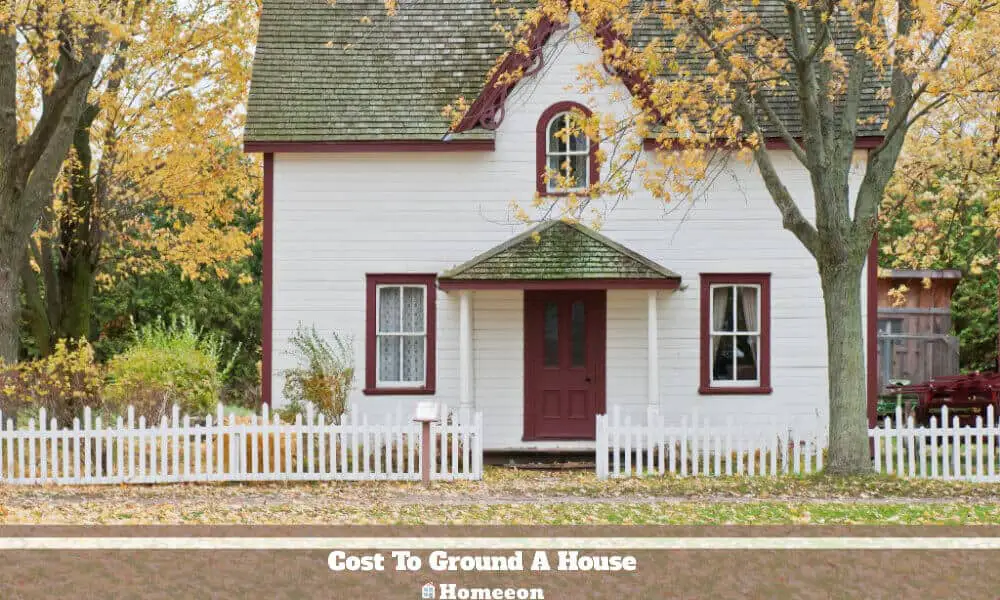Last Updated on August 5, 2023 By Emma W. Thomas
Grounding a house typically costs between $1,500 to $3,000. Factors such as location, house size, and electrical system complexity influence the cost. Proper grounding ensures safety by redirecting electrical surges and preventing damage to appliances and electronics.
The Cost Breakdown: How Much Does It Cost to Ground a House?

Grounding a house is an essential step in ensuring the safety and functionality of your electrical system. It provides protection against electrical faults, minimizes the risk of electric shock, and ensures the smooth operation of appliances. However, you might be wondering, what is the cost of grounding a house? Let’s delve into the details to give you an estimate of how much you can expect to spend.
- Professional Inspection – Approximately $150 to $300:
Before beginning any grounding work, it is crucial to have a licensed electrician inspect your home’s existing electrical system. The inspection cost typically ranges between $150 and $300. An inspection ensures that the grounding process is carried out correctly and according to necessary standards. - Material Costs – $100 to $500:
The cost of materials can vary depending on several factors, including the size of your house and the specific requirements of your electrical system. Basic grounding materials, such as copper grounding rods, clamps, and wires, can cost around $100 to $200. Additional costs may include grounding connectors, grounding plates, and grounding electrodes, which can add another $100 to $300 to the total material expenses. - Labor Costs – $500 to $2,000:
The labor expenses associated with grounding a house are a significant part of the overall cost. Electricians usually charge an hourly rate ranging between $50 and $100. The total labor cost depends on the complexity of the job, the size of the house, and the local rates. On average, you can expect to spend between $500 and $2,000 for professional labor services. - Permits and Inspections – $100 to $500:
Obtaining necessary permits and scheduling inspections are essential steps in ensuring the legality and safety of the grounding process. Permit fees can range from $50 to $300, depending on your locality. Inspection fees typically fall within the $50 to $200 range. It is important to budget for these costs to ensure compliance with local regulations and avoid potential fines. - Additional Costs – Variable:
The total cost of grounding a house may also include additional expenses such as replacing outdated or faulty electrical components, upgrading electrical panels, or addressing wiring issues. These costs can vary significantly based on the size and condition of your electrical system and should be assessed on a case-by-case basis.
House Grounding: What It Means
House grounding, also known as electrical grounding, is a vital aspect of home electrical systems. It serves to protect you, your loved ones, and your electrical appliances from the potential dangers associated with electrical faults and static electricity buildup. In this listicle, we will delve into what house grounding is, its importance, and how it works.
How House Grounding Works:
- Grounding Electrode: A grounding electrode, often in the form of a copper rod or metal water pipe, is installed and connected to the electrical ground system. This provides a direct path for electricity to travel into the ground.
- Grounding Conductor: A grounding conductor, typically made of copper or aluminum, is connected to the grounding electrode and extends throughout the electrical system, linking outlets, switches, and appliances to the grounding point.
- Ground Fault Circuit Interrupter (GFCI): GFCIs are specialized outlets or circuit breakers that monitor the flow of electricity and instantly shut off the power when an abnormality or electrical fault is detected, preventing electric shock.
What Is The Cost Of Grounding Different Parts Of The Home?
Electrical installation costs vary depending on the fixtures as well as the location of your home. The following are some estimated charges for these installations;
Replacing Or Repairing An Outlet Switch Or Receptacle
Repairing an outlet switch is a simple task, but the electrician will charge a call-out fee plus labor. A few minutes of the job may cost between $100 and $150. To get the most out of a service call-out fee, you can have the professional replace several outlets. You can learn to replace outlet receptacles individually to save some money since they cost as little as $3 each.
Cost Of Grounding An Outlet
You may want to turn a 2-slot outlet holder into a 3-slot one to accommodate 3-prong plugs. This task is simple for an experienced electrician, especially if the circuit breaker or the fuse box is grounded. This job may cost from $100 – $150, with the highest charge being the service call-out fee. Make sure that you get all the updates done together.
This cost may go up (to at least double) if the electrician has to install grounding at the main fuse or circuit breaker panel.
Replacing An Ordinary Outlet Holder With GFCI
If the electrician is replacing a normal outlet receptacle with a ground-fault circuit interrupter (GFCI), it is a simple task that costs around $120 and $150. This charge includes small labor and service call fee. However, if the project involves adding a new outlet location and running a cable, you may have to pay between $200 and $250. If you decide to do the job yourself, you can spend between $15 and $25.
Establishing A New Switch Or Outlet
If the task involves installing a new switch or outlet where there is none, it will require one to create an opening in the wall. The electrician will also have to fish a new cable to a power source, fix a new device and wall box, and make the connections. This job will cost an average of between $150 and $200. For a skilled electrician, this is a simple project that can take only 30 minutes.
Fixing A 220/240-Volt Outlet
An electrician may need to run a conduit when wiring a 220/240-volt outlet for a clothes dryer. Installing a new circuit breaker or reorganizing circuit breakers in the main panel may also be necessary. While this task is not harder than wiring any ordinary outlet, the electrician will charge it depending on the cable length to be run. The price will also depend on the amount of time they anticipate to take.
On average, installing a 220/240-volt outlet cost about $300
Changing A Circuit Breaker
Sometimes circuit breakers will wear out, calling for a replacement, and a few homeowners may replace them on their own. If you decide to hire an electrician’s services, you will spend between $150 and $200 to replace a circuit breaker switch. This cost includes both labor and materials.
If you are a homeowner with some wiring knowledge, you can replace a circuit breaker with much ease. If you can do it yourself, the cost can reduce to between $10 and $40 depending on the kind of breaker.
Connecting Three-Way Switches
It will take a skilled electrician from one to two hours to install a set of three-way switches. If the electrician will install the switches in two locations and requires new wall boxes and cables, it will cost you from $200 to $500. But if the electrician will utilize an existing switch location and add only one extra switch, it will cost between $150 and $250.
Rewiring A Home
The cost of rewiring a home with an old installation varies depending on the accessibility of the cables. Such installations include knob-and-tube wiring. Prices may also vary depending on whether other improvements such as main service upgrades are necessary at the same time. The home may also require the addition of new circuits that will impact greatly the cost.
A house in which walls have to be opened to run new cables will cost more than cables run through walls. Cables can also run through ceiling and floor cavities, and this will reduce the cost considerably.
Average Costs As Per Home Size

| Size Of The Home( In Square-Foot) | The Average Cost Of Rewiring |
| 1000 | $1600 to $3800 |
| 1200 | $1900 to 4500 |
| 1500 | $2300 to $5600 |
| 2000 | $3200 to $7600 |
| 2500 | $2500 to $9400 |
| 3000 | $4800 to $11400 |
Rewiring tasks include removing all outdated cables and running new NM cables. The cables are connected to existing appliances and breakers. If you are replacing devices and fixtures or updating the main service, the cost will be higher.
Modernizing The Electrical Service
If you are living in an older home, the chances are that the electrical service is outdated. The service may no longer meet the demands of a modern home and the electric devices there. Most old homes had 60-amp services installed when most appliances run on gas. Modern homes require 100-amp service as the standard service that may not be adequate for larger homes or several devices. A 200-amp service is ideal for bigger homes, but for larger homes with many appliances such as radiant floor systems and swimming pool heaters,a 400-amp service is installed.
| Service Upgrade | Cost |
| 100-amp service | $850 to $1600 |
| 200-amp | $1300 to $2500 |
| 400-amp | $2000 to $4000 |
Upgrading the electrical service involves installing a new meter, entry wires, circuit-breaker panel, disconnect, and weather head. Your electrician will, however, not install any new or replace circuit wiring for the base cost.
Adding New Wires Or Wiring A New House
Adding new wires or cabling a new house is generally cheaper than rewiring a system that is already in place. It is easier to run cables while the ceilings and walls are open and this lowers the labour costs. You can calculate the rough-in wiring cost by getting the linear footage of each wall and multiplying it by $8. For example, on a national average, a 2000-square foot home with about 450 linear feet of walls will cost $3800 to wire it.
These rough-in costs include electrical boxes and cables but not the installation of light fixtures or devices. If this will be done, additional costs will be incurred.
Wiring A Basement
One of the most common home remodeling tasks is finishing a basement. This project involves adding some electrical circuits, light fixtures, and wall outlets. Generally, wiring a 1000-square-foot basement area costs between $800 and $1500. This cost depends on whether the basement is one open large space or is subdivided into several rooms.
This cost includes installing boxes, running cable, and making installations. Additional costs apply to light fixtures and other appliances.
Cabling A Garage
An old garage may be lacking electrical service altogether. However, the 2017 National Electric Code (NEC) requires a garage to have a 20-amp circuit. This circuit should have at least one duplex receptacle that is GFCI-protected near each vehicle bay. The circuit can’t serve outlets that are on the garage’s outer wall.
While it is not a requirement for one to update an old garage to meet new code regulations, you may want to comply with the code. If you are planning to sell your home, this may add to its value. The cost of wiring a garage varies depending on how complicated the task is. For example, a detached garage that requires an underground feeder cable to deliver a new circuit will cost more than wiring an attached garage. The cost will also be higher if you want to install a 240-volt receptacle for recharging an electric car.
On average, adding circuits to a garage may cost between $1000 to $4000. However, this depends on whether the garage is detached or attached to an underground feeder cable.
Conclusion
The cost of grounding a house varies depending on the type of work to be done. It will also depend on the experience and expertise of the electrician doing the work. Before engaging a professional to do the task for you, make sure you know what you want and do a thorough search to find out what you require.
Unless you have electrical wiring experience, avoid doing the tasks yourself, as this can be risky.
References:
https://southslopenews.com/how-much-does-it-cost-to-ground-a-house/
https://howmuchdoesitcost.io/ground-a-house/
Emma is a graduate of Domestic Science or Family and Consumer Sciences (Home Economics) from the University of Wisconsin. She has 7 years of experience Working with the strategic section of BestBuy and now writing full-time for Homeeon.
From Managing the Home, Interiors, Cleaning, and Exteriors to Gardening and everything about Making A Home Liveable – is her passion and this Homeeon is the result of this.
Emma loves decorating her home with the best stuff found online. She cares about quality over anything and writes reviews about them here in Homeeon. Get in touch with her over Pinterest.
Keep reading her blogs.

